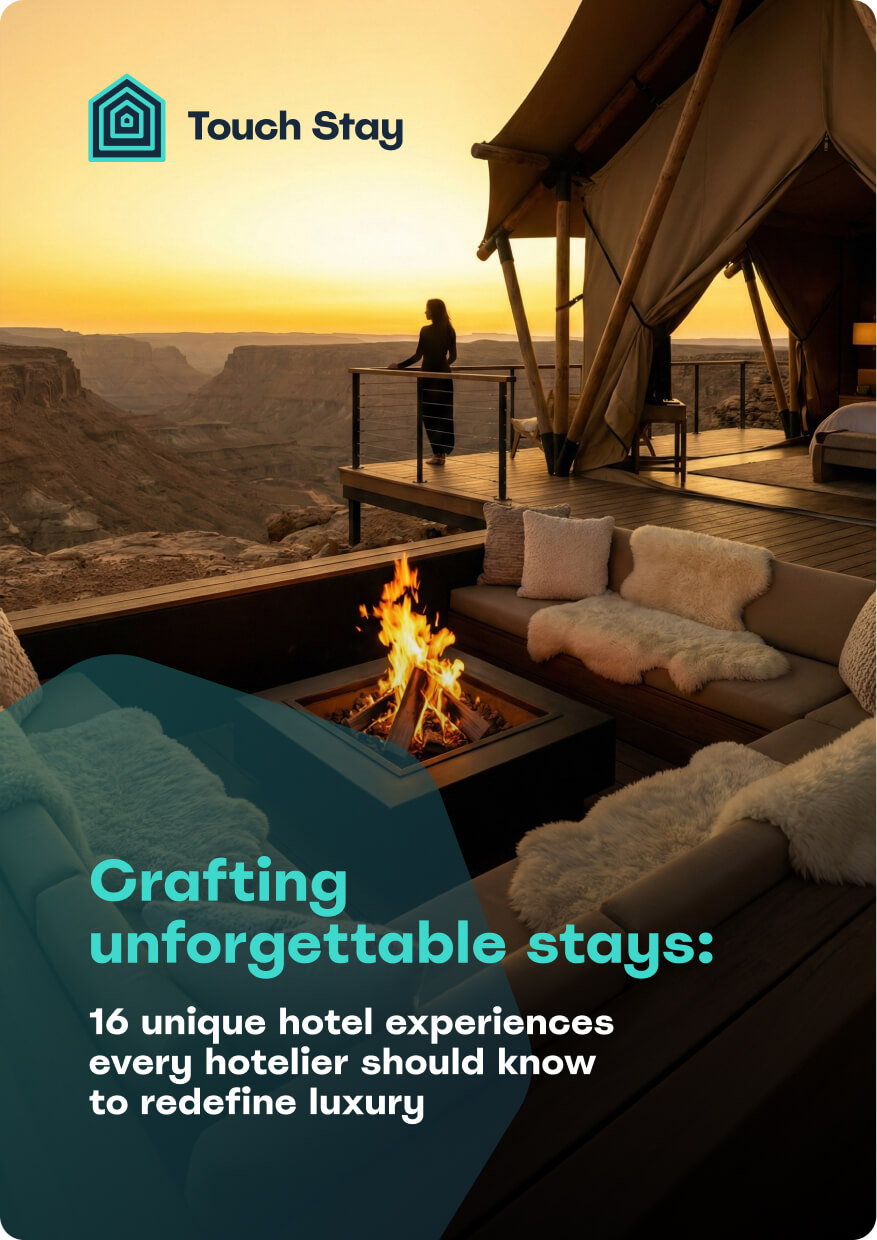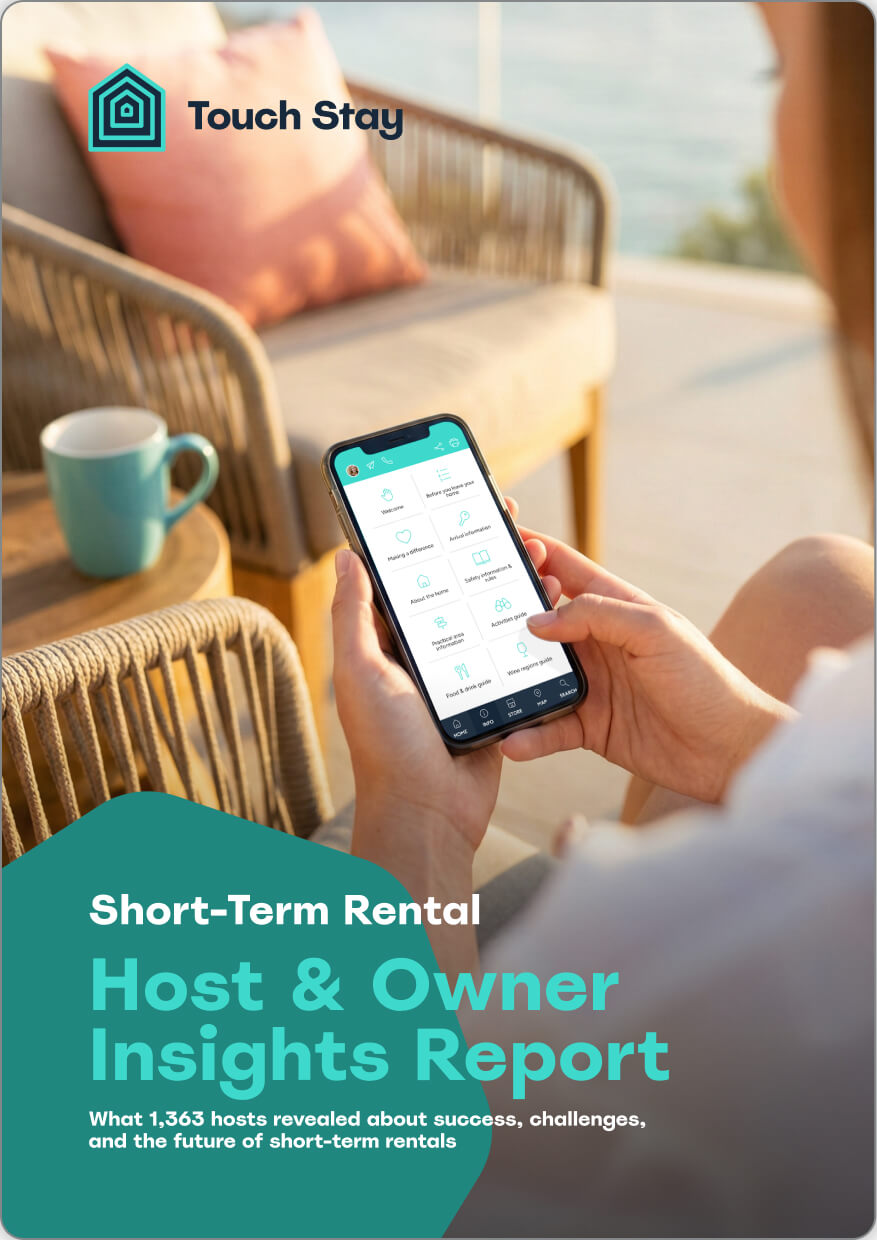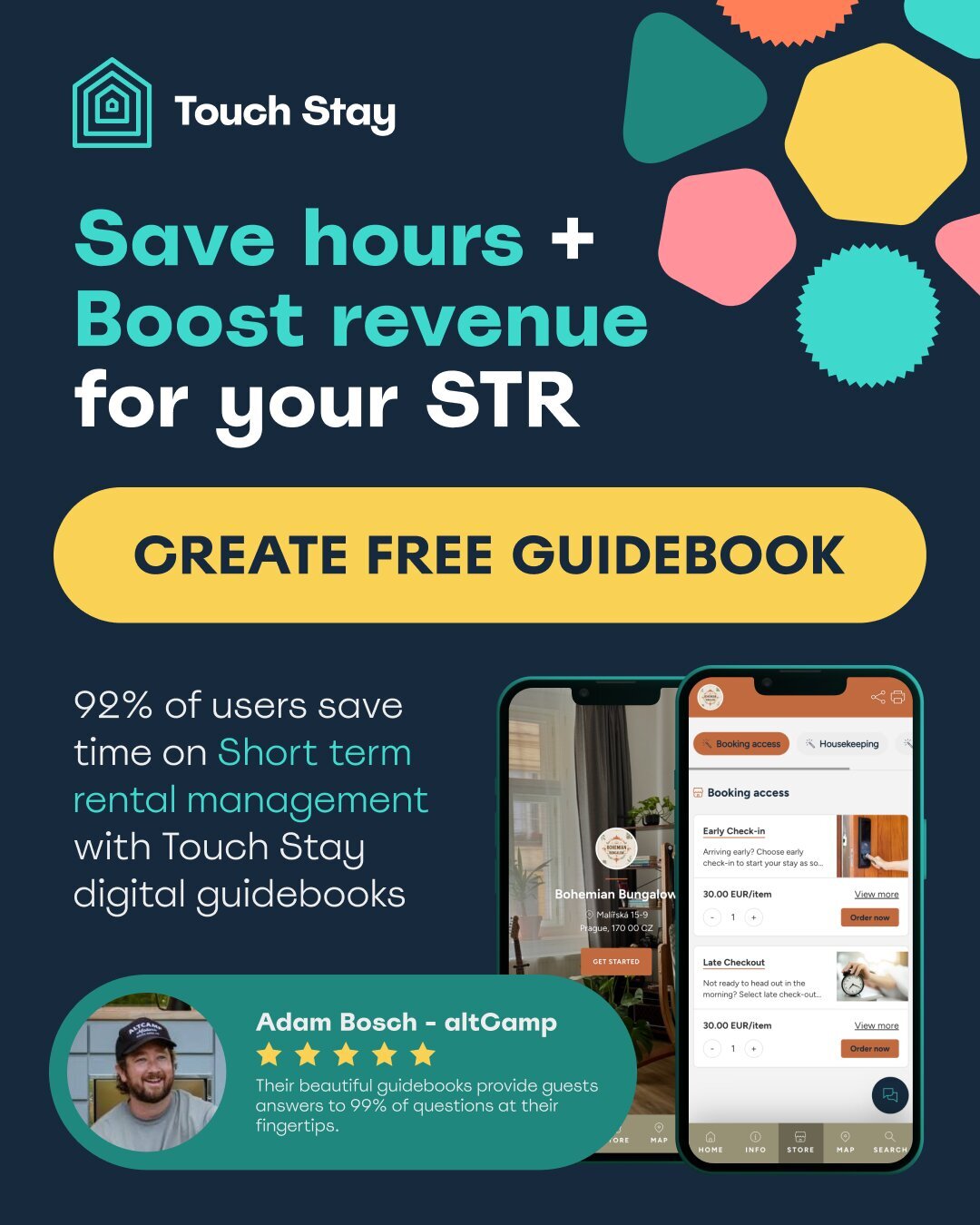Hosting on platforms like Airbnb has transformed countless homes into profitable ventures. However, with this opportunity comes the responsibility of ensuring the safety and security of your property and neighbourhood.
While Airbnb has implemented certain measures to screen guests, relying solely on their process might leave you vulnerable to potential issues.
By the end of this guide, you'll have a clear understanding of Airbnb's screening process, the potential risks involved, and actionable steps to implement your own effective measures and build a thriving short-term rental business.
- What are guest screening and background checks?
- Does Airbnb do background checks?
- Should you do your own Airbnb background check?
- How to screen Airbnb guests
- What to look out for when screening guests
- The importance of Airbnb background checks
- Know your guest: building trust and safety
- Can you automate the Airbnb guest screening process?
- Final thoughts on guest screening
- Frequently Asked Questions
What are guest screening and background checks?
Guest screening involves reviewing a potential guest’s Airbnb profile, reading reviews from past hosts, and evaluating their behavior and booking history.
A background check, on the other hand, refers to a deeper investigation into a guest’s criminal record, identity verification, and any potential risks they may pose.
While Airbnb provides a basic background check through its platform, many hosts prefer to take additional measures to make sure they are renting their property to responsible and trustworthy individuals.
Does Airbnb do background checks?
Airbnb has introduced a basic level of guest verification, mandating information such as:
- Government-issued photo ID
- Email address
- Phone number
Airbnb's background checks vary widely by country due to differing legal requirements. In regions like the U.S. and parts of Europe, these checks are more thorough, including criminal records and sex offender registry searches. Elsewhere, the checks might only cover basic identity verification.
While these measures can deter some risks, they don't guarantee safety, as they are mainly reactive and occur after bookings are made. Also, they may not catch guests with histories of minor or unrecorded offences.
Since the checks are not comprehensive for every guest and depend on available information, hosts should not rely solely on Airbnb's process, especially in higher-risk situations or with valuable properties. Additional screening measures are recommended to better protect hosts.
What information does Airbnb require from guests?
Airbnb requires guests to provide the following information to create a profile and book a stay:
- Government-issued photo ID: this verifies the guest's identity and helps prevent fraudulent bookings.
- Email address: this allows for communication between the guest and host before, during, and after the stay.
- Phone number: similar to email, this provides another avenue for communication and can be helpful in emergencies.
- Profile details: this includes a bio and photos that can give the host a sense of the guest's personality and travel style.
- Booking history: this allows the host to see if the guest has any previous stays on Airbnb and any reviews they may have received.
It's important to note that the thoroughness of Airbnb's background checks varies by location. In some regions, like the US and parts of Europe, checks might include criminal records and sex offender registry searches. However, in other areas, checks may only cover basic identity verification.
How reliable is airbnb guest background check?
Airbnb's guest background checks offer some level of security, but they shouldn't be solely relied upon. Here's why:
- Limited scope: background checks might not cover minor offences or those not reported.
- Regional variations: the thoroughness of checks depends on location, with some areas having more comprehensive screening than others.
- Reactive nature: checks typically occur after a booking is made, not proactively to prevent bookings from high-risk individuals.
For these reasons, it's highly recommended that hosts conduct their own additional screening measures alongside Airbnb's process.
Should you do your own Airbnb background check?
Given the limitations of Airbnb's screening process, conducting your own Airbnb guest screening is highly recommended. While there are costs and time implications associated with Airbnb background checks, the potential benefits far outweigh the drawbacks.
By investing in a comprehensive screening process, you can significantly reduce the risk of negative experiences, protect your property, and enhance your overall hosting experience.
Benefits of conducting your own background check:
- Increased control over guest selection and property protection.
- Reduced risk of property damage, theft, parties, or other disruptions.
- Enhanced trust and communication with guests through a more involved screening process.
- Improved guest experience by demonstrating a commitment to safety and security.
- Potential for increased revenue through attracting high-quality guests and avoiding costly issues.
- Peace of mind knowing you've taken proactive steps to protect your investment.
However, it's essential to consider the following:
- Legal and ethical implications of conducting background checks.
- Privacy concerns and the importance of handling guest information responsibly.
- Costs and time investment associated with background checks and the screening process.
- Potential for false positives and the need for careful interpretation of results.
By carefully weighing these factors, you can determine if conducting your own background checks aligns with your hosting goals and risk tolerance.
How to do your own guest screening process
Implementing a robust Airbnb guest screening process involves a combination of steps:
1. Reviewing a guest's Airbnb profile
- Assess profile completeness and professionalism, including photos, bio, and reviews.
- Analyse reviews in detail, paying attention to patterns of behaviour, communication styles, and any red flags.
- Check booking history, including length of stays, review details, cancellations, and any inconsistencies.
2. Google their name
- Use search engines to find information about the guest, such as social media profiles, news articles, or public records.
- Exercise caution when interpreting online information and avoid making hasty judgements based on limited data.
- Consider using social media search tools or people search engines to gather additional information.
3. Ask them some basic information
- Request additional information about the guest's travel plans, party size, and reason for the trip.
- Pay attention to communication style, responsiveness, and any inconsistencies in their answers.
- Consider asking open-ended questions to encourage more detailed and informative responses.
Asking the right questions can be a crucial part of your screening process. Here are some Airbnb questions for guests that can help you gather important information:
- What is the purpose of your trip?
- How many people will be staying at the property?
- Have you stayed in an Airbnb before? If so, how was your experience?
- Do you have any special requirements or requests for your stay?
- Are you familiar with our house rules? Do you have any questions about them?
- What are your arrival and departure times?
- Do you plan on having any visitors during your stay?
- How do you plan to spend your time in the area?
- Do you have any allergies or sensitivities we should be aware of?
- Is there anything else you'd like us to know about your stay?
These questions can help you get a better sense of your potential guests and their intentions, allowing you to make more informed decisions about whether to accept their booking.
4. Consider using a guest screening provider
Research and choose a reputable platform that aligns with your needs and budget. Compare features, pricing, and customer reviews before making a decision. Use platforms that offer background checks, identity verification, and other screening tools. Some examples include:
These platforms often offer features such as:
- Automated Airbnb background checks
- Identity verification
- Social media analysis
- Review aggregation and analysis
- Risk assessment scores
By leveraging these tools, you can save time while still conducting thorough screenings. However, it's important to use these platforms as part of a comprehensive screening process, not as a replacement for your own judgement and communication with potential guests.
5. Trust your instincts
- If something feels off about a guest, don't hesitate to decline the booking. Your intuition is a valuable tool in the screening process.
The Airbnb vetting process can be supplemented by your own screening methods. While Airbnb does perform some checks, knowing your guest through your own vetting can provide an extra layer of security and peace of mind.
6. Create a questionnaire
Creating a questionnaire for potential guests is a great way to assess their suitability for your property. By asking a few key questions, you can better understand their intentions and see if they’re a good fit for your space. Some questions to consider include:
- What’s the purpose of your visit (e.g., business, vacation)?
- How many people will be staying with you?
- Have you stayed in an Airbnb before? If so, how was your experience?
- Do you have any special requests or needs during your stay?
These questions help establish open communication with the guest and can also give you insight into their level of responsibility. For example, if a guest is vague or reluctant to answer, it could raise a red flag. This can be especially useful when dealing with guests who have little to no reviews, as it provides another way to evaluate their reliability.
7. Check other platforms
While Airbnb reviews are a great starting point, checking other platforms for guest information can give you a more comprehensive view. Many guests use other vacation rental platforms like Vrbo, Booking.com, or HomeAway. If a guest has stayed on those platforms before, you can search for reviews from other hosts.
In addition, social media platforms like LinkedIn or Facebook can also provide insights into a guest’s background. Many people have professional profiles or public posts that can give you a better idea of who they are, especially if they don’t have a detailed Airbnb profile.
What to look out for when screening guests
While conducting your Airbnb guest screening process, be mindful of the following red flags:
- Incomplete or inconsistent information: gaps in the guest's profile or contradictory information can raise concerns.
- Negative reviews: a history of negative reviews from previous hosts, especially those involving property damage, disrespectful behaviour, or noise complaints, should be taken seriously.
- Last-minute bookings: while not always a red flag, last-minute bookings might indicate a guest with a flexible itinerary or potentially hidden reasons for their trip.
- Unreasonable requests: guests who make excessive demands or have unusual requirements might be more likely to cause problems.
- Avoidance of direct communication: reluctance to provide information or answer questions can be a warning sign.
- Multiple bookings in a short period: this could indicate a party or event, which might violate your house rules.
- Suspicious online presence: red flags can include excessive social media activity, negative posts, or affiliations with questionable groups.
- Overly enthusiastic inquiries: while enthusiasm is generally positive, overly enthusiastic inquiries without specific questions about your property might indicate a potential party or event.
- Lack of interest in the local area: guests who show no interest in the local area or attractions might be less likely to be respectful of the neighbourhood.
- Evasive or defensive behaviour: guests who become defensive or evasive when asked clarifying questions might be hiding something.
Remember, these are just potential indicators and should not be used to make generalisations about guests. It's essential to consider each situation individually and use your judgement.
The importance of Airbnb background checks
As a host, understanding the importance of thorough Airbnb background checks can help you make more informed decisions about your guests.
Background checks can reveal important information such as:
- Criminal history
- Sex offender status
- History of property damage
- Verification of identity
By conducting your own background checks or using a third-party service, you can gain a more comprehensive understanding of your potential guests. This additional layer of security can help protect your property, your neighbours, and your peace of mind.
Know your guest: building trust and safety
The concept of "know your guest" is fundamental to creating a safe and enjoyable Airbnb experience for both hosts and guests. By taking the time to get to know your guests through careful screening and communication, you can:
- Build trust and rapport
- Set clear expectations
- Identify potential issues before they arise
- Create a more personalised experience
- Protect your property and community
Remember, the goal is not to invade privacy or discriminate, but to ensure a safe and positive experience for everyone involved.
Can you automate the Airbnb guest screening process?
While automation can streamline certain aspects of guest screening, it's essential to remember that it cannot replace human judgement. Guest screening involves assessing various factors, including communication style, intuition, and overall guest profile, which are difficult to automate.
However, there are tools available to assist in the process:
- Guest screening platforms: these platforms can automate Airbnb background checks, identity verification, and other screening tasks.
- Review analysis tools: software can help analyse guest reviews and identify potential red flags.
- Communication platforms: using dedicated platforms can streamline communication with guests and track interactions.
It's important to use automation as a supplementary tool rather than relying solely on it. Human oversight remains crucial in making informed decisions about guest suitability.
Final thoughts
Implementing a thorough guest screening process protects your property, enhances guest experiences, and ensures neighborhood safety. Airbnb’s checks are foundational, but adding your own enhances security. Incorporate a downloadable vacation rental agreement to formalize your process and clarify terms.
Enhance your security with our free vacation rental agreement template.
Combine your diligence with Airbnb's measures for a safer environment. Trust your instincts and prioritize your property’s well-being.
Additional tips:
- Set clear expectations: clearly communicate your house rules and expectations to potential guests.
- Require guest verification: encourage guests to verify their identities through Airbnb's verification process.
- Collect security deposits: requiring a security deposit can deter potential damage and provide financial protection.
- Maintain open communication: establish clear communication channels with guests before, during, and after their stay. Touch Stay guidebooks are perfect for this!
- Review local regulations: familiarise yourself with local laws and regulations regarding guest screening and short-term rentals.
- Consider insurance: explore additional insurance options to protect your property and liability.
- Build relationships with neighbours: foster positive relationships with neighbours to create a supportive community.
- Continuously update your screening process: stay informed about emerging trends and best practices in guest screening.
- Balance thoroughness with efficiency: while thorough screening is important, aim to streamline your process to avoid deterring potential guests.
- Be consistent: apply your screening process equally to all potential guests to avoid discrimination claims.
By following these guidelines and adapting them to your specific needs, you can significantly enhance your guest screening process and create a safer and more enjoyable hosting experience.
Remember that effective guest screening is an ongoing process that requires attention, adaptability, and a commitment to creating positive experiences for both hosts and guests.
In conclusion, while Airbnb provides a basic level of screening, taking control of your own guest vetting process is crucial for success as a short-term rental host.
By implementing a comprehensive screening strategy that includes Airbnb background checks, thoughtful communication, and leveraging available tools, you can minimise risks and maximise the benefits of hosting on Airbnb. Stay informed, trust your instincts, and prioritise safety to create a thriving and secure short-term rental business.
Elevate your Airbnb game with a Touch Stay digital guidebook.
Frequently Asked Questions
Yes, Airbnb does perform background checks on hosts, including identity verification and criminal background screening. However, the process is not as extensive as the checks for guests.
Hosts can also choose to enable additional verification options such as government ID verification to further confirm their identity and that the person renting out the property is trustworthy.
Screening guests without reviews can be challenging, but there are still steps you can take to assess their reliability. First, carefully review their Airbnb profile, including the information they provide about themselves and their travel history. You can also communicate with them before accepting a booking, asking questions about their stay, their expectations, and their reason for traveling. Additionally, you can verify their ID if they haven't done so already.
Airbnb uses a variety of methods to detect party-related activity. For example, the platform monitors the number of guests in a booking and flags any discrepancies with the listing’s maximum occupancy. They also track complaints from neighbors, including noise or other disturbances. Additionally, some hosts enable security cameras or noise-monitoring devices (within Airbnb’s guidelines) to help prevent parties.

Ned
Ned has clocked up over 11 years in digital marketing and comms, with a strong focus on creating engaging content for a range of brands and agencies. When he’s not writing, he can be found digging for records, peering through his telescope at the night sky, or onboard his local lifeboat where he volunteers as a crewmember.
Be the first to know!
Join our newsletter for early access to:
- ✅ Free guides
- ✅ Pro tips & tricks
- ✅ Time saving tutorials
- ✅ Latest blog posts
- ✅ Checklists & templates









.png?width=50)












